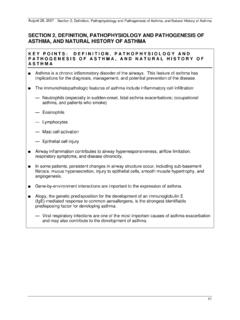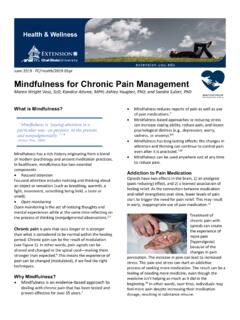Transcription of Inflammation Tests - Cleveland HeartLab, Inc.
1 6701 Carnegie Ave. | Suite 500 | Cleveland , OH 44103 | p | f | | your risk of a heart is myeloperoxidase? Myeloperoxidase, or MPO, is an enzyme that is released by white blood cells called macrophages that measures your body s response to damaged artery walls that have become thin, cracked, and ultimately unstable due to cholesterol accumulation and Inflammation . Why check my MPO levels? When the walls of your arteries become damaged, cholesterol can enter and build up. Your body tries to remove the cholesterol by sending in immune cells. These cells wrongly think the cholesterol particles are bacteria or viruses that have invaded the body, and try to kill them by releasing MPO which acts like bleach. Instead of killing the cholesterol, MPO damages the cholesterol and contributes to the formation of foam cells, a name for cholesterol-filled immune cells. Instead of removing the cholesterol, these foam cells get stuck in the artery wall and contribute to chronic Inflammation .
2 Over time, the artery wall gets filled with plaque - a mixture of cholesterol, immune cells and foam cells - which goes relatively unnoticed until it is too as lava in a volcano becomes hot and bursts open through the surface of the earth, plaque buildup inside the artery wall can become inflamed and burst through the wall of the artery to where the blood flows. When the plaque ruptures into the blood, the body responds to this injury by forming a clot. If the clot causes a complete blockage of blood flow, this can cause a heart attack. Whether you have traditional risk factors for heart or vascular disease, such as abnormal cholesterol levels or high blood pressure, or known heart disease, the MPO test can help your medical provider find out if you have Inflammation in your arteries that can add to your risk for a heart attack. When should the MPO test be performed? The MPO test can be performed at the same time your medical provider runs other Tests , such as a cholesterol test, to determine if you are at increased risk for a heart attack.
3 How should I prepare for the MPO test? The MPO test does not require any special preparation. You do not need to be fasting, and can be taking medications. What can I do to help lower my MPO levels? There are a number of things you can do to lower your overall risk of heart disease, as well as lowering your MPO levels. It is important to maintain a healthy blood pressure because high blood pressure may damage the vessel wall and begin plaque formation. A heart-healthy diet is also recommended, as research has shown that weight loss helps decrease Inflammation . If you are a smoker, the importance of stopping smoking to decrease the chance of plaque rupture and clot formation is even more urgent. There are prescription and non-prescription medicines your medical provider can give you that reduce MPO medical provider will work with you to develop a treatment plan that is right for you to help reduce your risk of a heart attack. This may include imaging testing, such as CIMT or coronary artery calcium scoring.
4 540 High<470 LowRELATIVE RISK MPO (pmol/L)470 - 539 ModerateCHL-P004d6701 Carnegie Ave. | Suite 500 | Cleveland , OH 44103 | p | f | | your risk for a heart attack or is the Lp-PLA2 Test? The Lp-PLA2 Test measures the amount of Lp-PLA2 in the bloodstream. Lp-PLA2 is an enzyme that can assess the amount of Inflammation in your arteries due to a build-up of cholesterol. Why should I get the Lp-PLA2 Test? The Lp-PLA2 Test can help assess your risk for heart disease or stroke. When LDL cholesterol (the carrier of bad cholesterol) gets into your artery wall, the body tries to get rid of it by making Lp-PLA2. Unfortunately, the actions of Lp-PLA2 contribute to increased Inflammation and increased cholesterol accumulation in the artery wall, forming what is called plaque. Inflammation can also make the cap covering the plaque thinner, which makes it more likely to rupture. The body responds to the rupture by forming a blood clot, which can block the flow of blood.
5 If the blood flowing to the heart is blocked, it may cause a heart attack, while blocked blood flow to the brain may cause a short, the Lp-PLA2 Test can help your medical provider better understand the health of your arteries and determine if you are actively growing plaque that is at risk for rupturing and developing a heart attack or stroke. Traditionally, the risk of having a stroke is associated with many factors including high blood pressure. Although high blood pressure is known to increase stroke risk, having high blood pressure and a high Lp-PLA2 Test result can put you at a much higher risk for stroke. But, it s important to remember that even if your blood pressure is controlled, a high Lp-PLA2 Test result alone still puts you at risk for a stroke. When should the Lp-PLA2 Test be performed? The Lp-PLA2 Test can be performed at the same time your medical provider runs other Tests , such as a cholesterol test, to determine if you are at increased risk for heart disease or stroke.
6 The Lp-PLA2 Test is recommended if you have two or more risk factors for heart disease, such as high cholesterol or obesity. How should I prepare for the Lp-PLA2 Test? The Lp-PLA2 Test does not require any special preparation. You do not need to be fasting, and can be taking medications. What can I do to help lower my Lp-PLA2 levels? There are a number of things you can do to lower your overall risk of heart disease, as well as lowering your Lp-PLA2 levels. Adopting a heart-healthy diet can help to lower your Lp-PLA2 levels. Eat more vegetables, fruits, and whole grain foods and reduce the amount of fatty foods you eat. Exercise can also help to reduce your Lp-PLA2 levels. If you smoke, quit. It is not easy but there are programs and strategies (including over-the-counter and prescription medications) that can improve your chance of success. Talk with your medical provider to find what works best for you. See your dentist. Periodontal disease may elevate Lp-PLA2.
7 There are prescription and non-prescrip-tion medicines, as well as supplements, your medical provider can give you that reduce Lp-PLA2 levels. Your medical provider will work with you to develop a treatment plan that is right for you to help reduce your risk of heart attack and stroke. 200 Low>200 HighRELATIVE RISK Lp-PLA2 (ng/mL)CHL-P002dCHL-P001c6701 Carnegie Ave. | Suite 500 | Cleveland , OH 44103 | p | f | | your risk for chronic is hsCRP? C-reactive protein (CRP) is produced by the liver when Inflammation is present somewhere in your body. Traditionally, the CRP test has been used to identify risk for infection or chronic inflammatory conditions. Now, there is a newer test available called high-sensitivity CRP, or hsCRP, that measures smaller amounts of CRP in the blood. Why should I get my hsCRP levels checked? Most of the time, you can tell if you have Inflammation . For example, if you cut your finger, you may see redness and swelling, and feel pain.
8 This is called acute Inflammation , or short-term Inflammation . Other times, Inflammation in your body may not be so obvious. This type of Inflammation may be present for a long period of time without any symptoms. This is called chronic Inflammation , or long-term Inflammation . Recently, it has been shown by researchers that chronic Inflammation may occur within the arteries of the heart, where it may play a role in the development and progression of heart disease, acting as a silent killer . Standard heart health Tests , such as cholesterol Tests , miss this chronic Inflammation . The good news is that chronic Inflammation can be monitored by measuring hsCRP levels in your blood. Researchers have shown that high hsCRP levels can indicate heart attack and stroke risk, even in apparently healthy individuals. High hsCRP levels are also a risk factor for people who do not have other risk factors that medical practitioners commonly look for such as high cholesterol or high blood pressure.
9 For people who have had a heart attack, elevated hsCRP levels may indicate if they are at risk for another heart attack or an ischemic should my hsCRP levels be checked? Your hsCRP level can be checked at the same time your medical provider runs other Tests , such as a cholesterol test, to determine if you are at increased risk for a heart attack or stroke. You may be a good candidate for hsCRP testing if you are at moderate risk of vascular disease, or have several other risk factors such as high cholesterol or a family history of heart should I prepare for the hsCRP test? The hsCRP test does not require any special preparation. You do not need to be fasting, and can be taking medications. Make sure you don t have a cold, the flu or a dental infection when being checked as hsCRP levels will go up when you re sick. Instead, you should wait until you feel better before you are checked. What can I do to help lower my hsCRP levels? Lifestyle changes, such as exercising more, eating more heart-healthy high fiber foods such as fruits/vegetables and whole grains or following a Mediterranean diet, can help to lower hsCRP levels.
10 Quitting smoking helps reduce the amount of general Inflammation in your body. Taking good care of your teeth can also help lower hsCRP and reduce your risk of heart disease. There are prescription and non-prescription medications that also can lower is important for you to work together with your medical provider to come up with a plan that is right for you.< ModerateRELATIVE RISK hsCRP (mg/L)> High6701 Carnegie Ave. | Suite 500 | Cleveland , OH 44103 | p | f | | MicroalbuminKnow your risk for endothelial do my kidneys do? Your kidneys have an important role in keeping you alive and well. Their main function is to get rid of waste and extra water from your body. This is done by the endothelium, or the thin layer of cells that line the blood vessels in the kidney, which act like a coffee filter. The kidney endothelium filters your blood to get rid of waste by making urine. Your kidneys also do other important things, such as help control your blood pressure.











